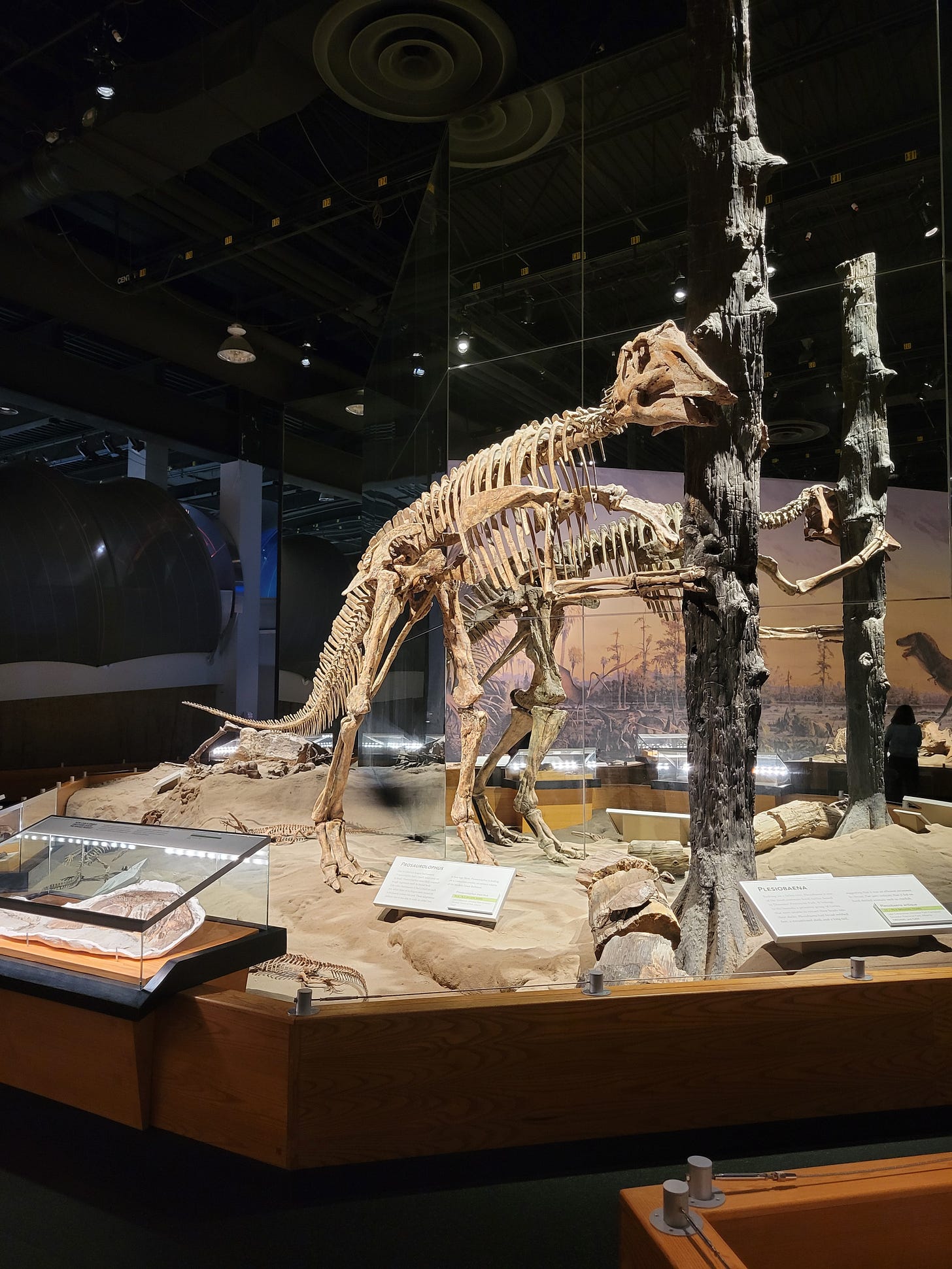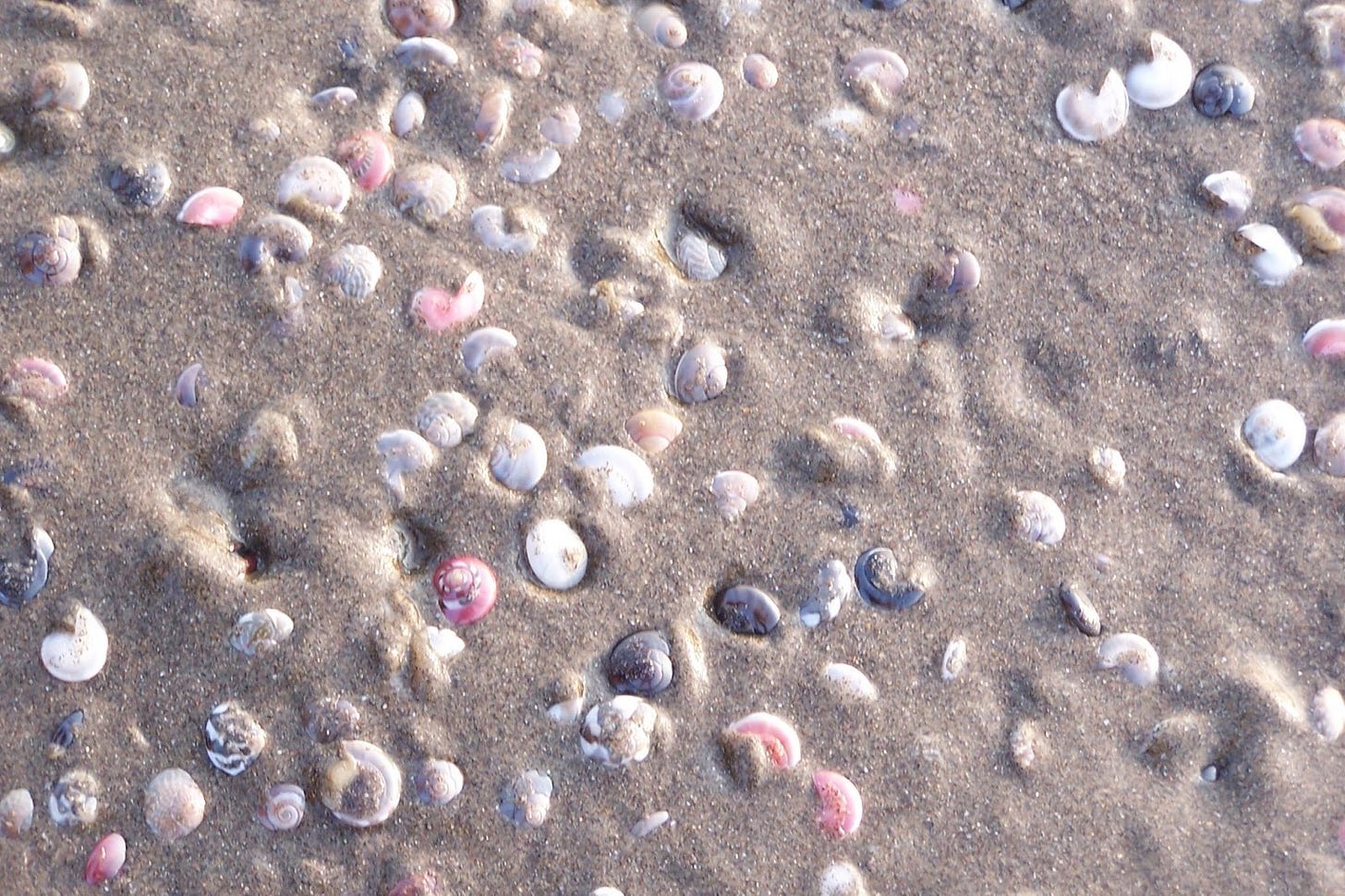"Ma, why did the humans go extinct?"
E61: Climate considered from five different voices and vantage points
The best idea can come from anyone, anywhere, at any time.
In this issue: five emerging writers, five different vantage points on climate.
My biggest takeaway? More people are talking sustainability and climate these days!
We are facing a defining issue of our time, right here on Earth. With twice as many brains and access to better technology, I am squarely in the camp that believes we can figure this thing out. We have the skill. We can create the technologies we don’t already have. We need momentum.
We’ve stepped up to big challenges before. In the 1960s there were half as many people on Earth (4 billion), and with the equivalent computing power of a calculator we sent a rocket to the moon. And brought it back. Landing man on the moon was a vanity project compared to the crisis facing us.
Mama Earth has now gathered up her skirts and is throwing a full-on hissy fit. She’s had enough. She waited patiently for us to read the memo with events like recurring droughts, hurricanes & typhoons from Sandy to Hagibis, and various west coast forest fires. To little avail. Years later, COP27 is underway (yes, there have been 26 of these starting in 1995, with the Rio UN Climate Summit in 1992). Concerned people are gathered - again - to discuss Climate. By the time you read the next edition of this newsletter, the world’s population count will have crossed 8 billion.
What can we do, as Tribe Tilt, to shift into a higher gear towards action?
Fresh thinking and new ideas are created at the nexus of new conversations, different perspectives and daily travails. The ideas that inspire and matter can surface from anywhere - a team of PhDs sitting in a lab; a group of tech-forward teens doing a science fair project; or a rickshaw driver tired of rubbing the soot off his face after a day labouring on Delhi roads.
Fresh thinking. And optimism. In the spirit of Kevin Kelly (The future will be shaped by optimists) and The Weekly Dose of Optimism from Packy McCormick.
A Spectrum of Climate Essays
Today I offer you a range of essays that cover a spectrum of sustainability thinking: food, energy, jobs, ClimateTech, the longview etc. We need this range - so that we can ensure the human race has a little extra runway on Planet Earth. If these essays make you think differently leave the writer a comment. And consider subscribing to their newsletter. Click on the underlined titles to go to each linked article:
The future of Seafood (is seaweed): Beck Hayes introduced me to the phrase Climate Cuisine. Feeding a world of 8 billion sustainably, this article shows the problem and articulates a solution (seaweed farms). Some of you may recall a similar essay E18: profiling Gabriella D’Cruz and her seaweed farms off the coast of Goa.
My favourite section: Bren Smith's farms, on the other hand, are one of the most sustainable forms of food production on the planet. Ocean farming is regenerative because it does not require any the inputs of traditional land-based agriculture: no fresh water, fertilizers, or feeds. It also helps mitigate climate change by absorbing carbon directly from the atmosphere for growth.
Fossilized Intelligence: How about the long view - the really long view - on climate? How would a future geologist decode this period of our time? Geologists bring the perspective of deep time and Ted Cross’ article really got me thinking — do we address climate as a 10-year, 30-year, or 1000-year challenge? Wearing my Futurist hat I question:
a. How far into the future will Humans still be present on Planet Earth?
b. Will that geologist be human? Or will another species be creating human dioramas in museums years from now?This section was vivid: Imagine finding the treasure trove of a fossilized garbage dump or rail terminal. Just as with fossilized bones, these traces will only be found in locations of active subsidence and deposition. The places where New York and Chicago lie today will be scraped down to bedrock by glaciers during the next ice age; Houston and New Orleans are safer bets for preservation.
What happens as the entire world switches to electric cars? Is our infrastructure set to handle that? More is more is an essay by nuclear engineer and energy specialist Wyatt Scherer. He discusses how we might manage our Energy grid during this transition.
The phrase that sticks out for me: Go out there and advocate for more energy, more electricity. No you are not killing the planet, it’s the only way out. Yes we will have to remove more emissions and that is why we need abundant reliable energy so we can create and deploy the technology to counter the worst effects of increasing emissions
Honey I shrunk the Garage - is a light-hearted but insightful look into the way transportation has changed over the past decades. Adrian Bukmanis understands a thing or two about vehicles given his strong interest in Formula 1. Adrian is an environmental consultant who also talks about F-gases (your air conditioner and fridge) so he knows more than he includes in this single essay.
Why his essay made this list: … you can make a car go further on less input and less materials. If you make it lighter. Extremely strong and extremely light is extremely possible – see Formula 1. It just needs economies of scale. Designing for efficiency … unlocks an array of benefits.
How a Tiger Forced Me to Start Writing - Ishan Shanavas, an 18-yr old Generation Z wildlife photographer who is dealing with species extinction with the only tools at his disposal - his camera and his pen. He is one example of how GenZ is creating new job opportunities in the climate space. His motivation is similar to that of wildlife photographer, conservationist and author Kathy Karn, our Meet a Member profile in E36
My favourite section: … this animal flickers on the edge of extinction. They persevere in a world bent on hacking away its home for industrialisation and development. In that moment, I realised one truth: my purpose lay in the beauty and preservation of the animal kingdom.
These emerging writers were part of the most recent class of Write of Passage. Together, we published over 468 articles. I was encouragingly struck by the growing proportion including climate in their material - whether discussing their daily work, as concerned parents, or as global citizens discussing a range of Planet Earth issues. Outlier - Cluster - Trend.
As a Futurist, I’m imagining a range of versions of our world 15-350 years into the future. Where does the version that Ted Cross talk about fit in? Wyatt’s essay reminds me that, unfortunately, zero emissions is not an on/off switch. Getting there is a journey in technology that may require different ways of thinking. As a human, a mother, I wonder, will my great-grandchildren be able to walk out the shallow quarter mile of beach in Goa at low tide digging out clams in the soft sand with their toes 100 years from now - as I and my great-grandmothers did?
Bouncing back through time, I ask what I can do today to steer the future towards the version I want? How can I …
I choose to do it by raising the volume on sustainability and climate conversations, creating hope, and connecting people and ideas. We need new voices to join the conversation - so that we can ensure the human race has a little extra runway on Planet Earth.
In the words of climate scientist Katherine Hayhoe, to make a difference let’s start to
talk about it
Did you discover something interesting today? Talk about it with those around you.
Would you be interested in more essay collections like this?
I am excited to welcome new members to Tribe Tilt - fellow author Regina from the beautiful Nebraska prairies, tamil-speaking Manhattanite Janahan, and Silvio from Milano, Italy.
If this article was forwarded to you, please join us:
We discuss raising future-ready leaders, climate, and the long view on the Future of Work. This is a community that believes in the best of humanity - connecting people, sharing ideas, exploring thoughts respectfully. And we believe we can make a difference to the people and places that are precious to us.
I would like to acknowledge the many contributors to this edition. Aside from the writers who allowed me to include their essays Beck Hayes, Ted Cross, Wyatt Scherer, Adrian Bukmanis & Ishan Shanavas, I was supported with valuable feedback and editing from many other peers in my Write of Passage class: writer Andrew Plainview, tech+sustainability Igor Shvartser, personal development coach Mak Rahman, Randy Garman (Chasing Answers), Edu-Parent Alexandra Zamora.
Stay healthy. From there all else becomes possible.
Karena





If the world changed so drastically for Covid, where the global death toll was about 15 million, why can't we change our ways for the environment where Billions of people are at risk. I believe the do-nothing scenario will result in 3 billion deaths by the end of the century from flooding and overheating.
Great read and wonderful suggestions to go deeper on climate.